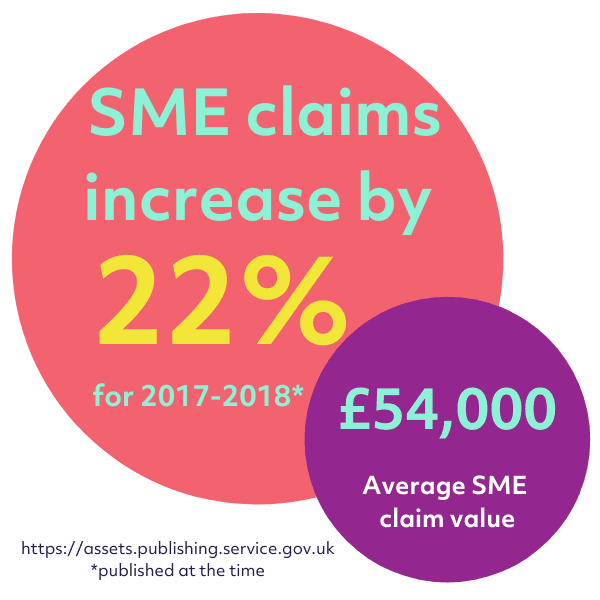Guides: I want to make an R&D claim, but which advisor do I choose?
- R&D Tax Credits
- Knowledge Hub
- 5 Min Read
Introduced in 2000, the R&D Tax Credit scheme was designed to encourage innovation within the UK, providing up to 33p for every £1 spent on qualifying activities. The scheme is available to both large and small businesses giving them access to vital funding This can be in the form of a Corporation Tax reduction, received as a cash rebate, loss relief or a combination.
As awareness of the scheme has increased, so has the number of advisors in the market. We know that selecting the best advisor can be difficult so we have created a free guide and scorecard highlighting key areas to look for when making this decision.
Free downloadChoosing the right advisor

Our claims process
Find out how we make a R&D claim
Your business deserves the best
Whether you are new to making an R&D tax credit claim or about to make your seventh, knowing you’re in the best hands is important. We have worked with many businesses over the years across various sectors and sizes and for every claim we submit we aim to achieve the maximum value possible.
The R&D tax credit claims process is complicated and can be time-consuming. We have created a process that puts our clients first allowing us to do the heavy lifting.
R&D claims, can I do it myself?
Why use a 3rd party to submit a claim?
The R&D tax credit claim process can be complicated, but it is not impossible to submit a claim yourself; our example R&D tax calculation is a free guide that can help you. Choosing to submit an R&D claim yourself means you will forgo the experience and knowledge of an expert, which could impact your claim value and success.
Three main R&D claim options
In the current market, you may come across 3 main types of advisors who can help you with your R&D tax claim.
- A “Big Four Accountant” company – Deloitte, PricewaterhouseCoopers (PwC), Ernst & Young (EY), or Klynveld Peat Marwick Goerdeler (KPMG)
- Your current Accountant
- An R&D tax specialist
With large accounting companies offering R&D tax credits in addition to their suite of services; your accountant assuring you that they can easily submit a claim as part of their existing activities and R&D tax credit specialists guaranteeing better returns, many companies are left with the question, who do I choose to make my claim?
Below we will look at the pros and cons of using each to make a claim.
Bigger doesn’t always mean better

Known as “The Big Four” these companies are the leading accounting firms in the world providing their clients with a suite of professional services, including R&D tax credits. With a wealth of expertise under one roof and recognisable success in the field of accounting and professional services, it is no wonder why many companies would select one of these to manage their R&D claim.
Pros:
Access to a large internal team of experts. The claim process involves more than just calculations and so having a team of experts who understand tax, accounting and the details of your project is vital to a successful claim.
Specialist support throughout the process. Despite all efforts, the process can be long, and having a team to keep you updated on progress can assist planning. Also, in the event that there is an HMRC compliance check our expert will be able to defend your claim.
Knowledge of the claims process. As experts, they will know the scheme very well and be responsive to any changes which may affect your claim.
Cons:
The value of your claim can be a determining factor. Despite having the resources to support your claim, choosing one of The Big Four may not be best for your business, especially if you have a small claim value. For some large firms whether they decide to submit a claim on your behalf may depend on how much they calculate your claim to be worth.
The size of your claim can also determine the type of service and support you will have access to. For smaller claims, some of these companies have developed tools or portals which provide guided assistance to claim submission. Such portals can be helpful if you are confident about the elements to include in a claim but can prove to be time-consuming and frustrating if not.
With most claims being made by SMEs it is important to consider whether your claim will get the right attention in the hands of a bigger company.
MPA supporting your innovation
For the last 13 years, we have supported UK innovation by helping businesses access R&D tax credits. Irrespective of your size or industry we are committed to ensuring that your claim is maximised and you’re in the best position to thrive.
Accountants, good at numbers but not engineers
R&D tax credit claims and usual accounting activities are very different, requiring a different set of skills and expertise. Most businesses have an accountant and so allowing their accountant to manage their claim seems like an obvious and natural decision. The problem is that an R&D tax credit claim is more than a numbers exercise, it requires technical knowledge of aspects of the projects being claimed for as well as an understanding of the claim process, qualifying activities and HMRC requirements.
Even Accountants make mistakes

Working with your existing accountant can be an easy choice because they are already a member of your team, have access to your financial information and already know your business. However, as much as accountants know the details of your finances, they are not as close to the details of your projects, crucial to a successful claim.
In our years of experience, we have had clients approach us having made a claim with their accountant and received a low claim value. We have also met clients who have failed to make a claim despite being eligible because they were never advised to. Below are some errors accountants can make when submitting your claim:
Making a claim for ineligible activities. When your claim includes activities that are not eligible this can bring down the value of your claim or open you up for an HMRC compliance check, which could lead to a hefty fine or further action.
Not keeping up with the rules. HMRC are good at changing the rules and over the years the rules around what can be included in a claim and cannot have become tighter. Keeping abreast with the latest changes is crucial to making sure that the right expenses are included
Failing to choose the right scheme. Offering returns of up to 33p for every £1 the SME scheme is the most rewarding. However, with two schemes, SME and RDEC, it is important that a claim is made under the correct scheme as failure to do so can impact your claim value. It is also not a rule that all small businesses fall into the SME scheme, depending on the type of funding options, some SMEs need to claim under the RDEC scheme.
Using an R&D tax specialist
The final group of advisors, R&D tax credit specialists, are experts and have experience designed to support you through the claims process. R&D tax specialists are also likely to be members of professional bodies such as The Chartered Institute of Taxation (CIOT) and will know the rules and type of information to present in your claim. They are also likely to have a close working relationship with HMRC and know how to prepare claims in a way familiar to the HMRC teams.
Download our free guide: How to select the right R&D tax credit advisor
Pros:
Technical knowledge. Ability to understand the details behind the processes in your project can lead to more qualifying activities being identified and potentially a higher claim value.
In-depth understanding of the scheme. With the experience of submitting various types of claims, across all sectors, specialists can create accurate claim reports to submit to HMRC. They can also spot claimable elements in projects that other advisors may not be able to see, such as indirect activities that qualify (administration, clerical and maintenance etc).
Defending your claim. No one would choose to be investigated by HMRC but if there are inaccuracies in your claim HMRC may action a compliance check which could lead to a penalty or fine. With most specialists enquiry defence is a standard part of their service, meaning they will defend the claim submitted to HMRC should questions arise, so that you don’t have to.
Cons:
No in-house team: Some companies claiming to be specialists outsource elements of your claim to other parties, which can lead to mistakes and delays.
Lack of experience: Unfortunately, not every advisor that claims they are specialists have the experience, qualifications or the knowledge to manage your claim. It cannot be stressed enough that the success of your claim will reflect the team behind it.
A shared passion for innovation
At MPA our vision is to support UK innovation, we believe in the great innovators in the UK and we are committed to helping businesses get access to vital funding so that they can thrive. We make it our priority to understand our client’s business as much as their projects. By doing this we can recommend and provide other innovation-related services such as EIS, SEIS, Patent Box and other ways our clients can obtain finance to strategically grow their business.
Find out if we are the right fit for you
Selecting the right advisor for your business is important to the success of your claim. Speak to one of our technical advisors today to find out if we can help you and your business.
Get the results you need with our team
